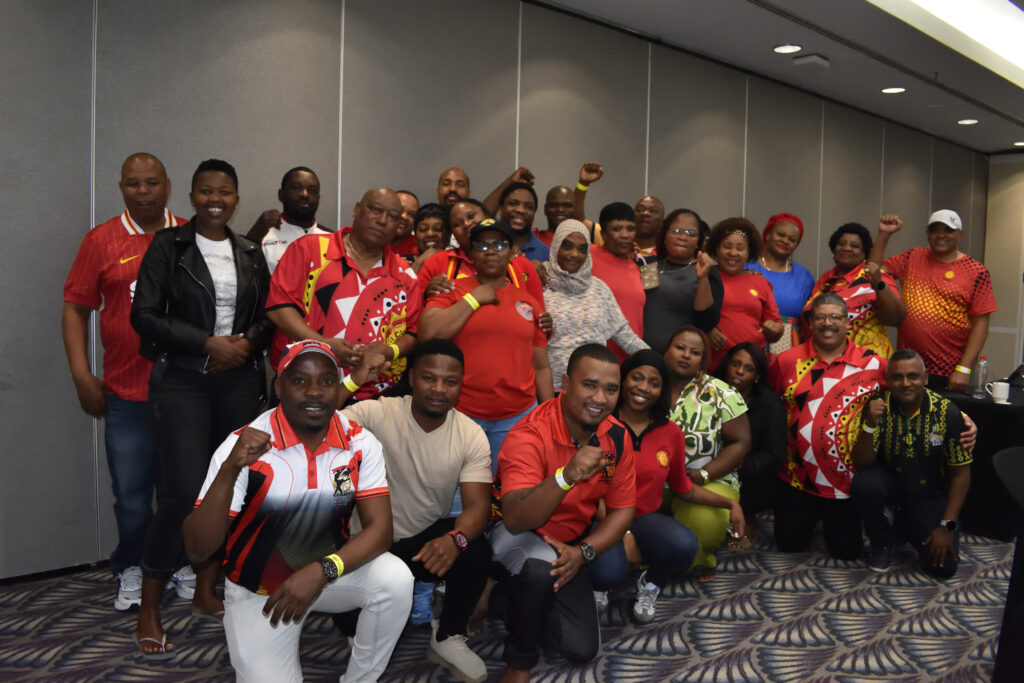21 August, 2025Textile, garment, shoe and leather (TGSL) workers in Eswatini and South Africa are calling for a Just Transition from carbon-intensive industries to low-carbon renewable energy economies that protects jobs and ensures economic equity.
This common vision emerged at a workshop in Durban, South Africa, on 14–15 August, where 34 union leaders, officials and shop stewards from IndustriALL affiliates, the Amalgamated Trade Unions of Swaziland (ATUSWA) and the Southern African Clothing and Textile Workers’ Union (SACTWU) came together to chart a path towards a fair and sustainable future.
The discussions centered on embedding a development-oriented approach within the Just Transition framework for the TGSL sector. Participants advocated shifting from the linear take-make-dispose model to a circular economy emphasizing resource efficiency, waste reduction and sustainable production. Recycling and upcycling, for instance, were highlighted as strategies to curb environmental pollution, conserve water and energy and generate employment.
While acknowledging the productivity gains from new technologies, unions emphasized that automation should augment rather than displace workers. To support this, they called for financing to fund upskilling and reskilling programs to equip workers for the transition.
Additionally, mandatory human rights due diligence across TGSL value chains was deemed essential to hold global brands and multinational corporations accountable and safeguard workers’ rights amid the shift to greener economies aligned with climate goals.
Given the sector’s female-dominated workforce, unions stressed the need for gender-inclusive policies addressing workplace gender-based violence and harassment, the gender pay gap and access to childcare, alongside the adoption of living wages to improve livelihoods.
Regional integration was identified as critical to bolstering intra-African trade, particularly under the African Continental Free Trade Area (AfCFTA), in the face of external pressures such as the 30 per cent tariffs imposed by the United States on South African garment exports. Enhanced industrialization, participants argued, could expand the TGSL sector’s manufacturing capacity, creating jobs to address the region’s acute unemployment, poverty and inequality. Statistics South Africa reports an expanded unemployment rate, including discouraged job seekers, of 43.1 per cent.
SACTWU has integrated sustainability into its Just Transition strategy, collaborating with the South African government’s National Cleaner Production Centre and engaging the Industrial Development Corporation (IDC) to finance solar panel installations in factories. The union also participates in the Southern African SOLTRAIN initiative, which promotes solar thermal systems across the Southern African Development Community (SADC), including solar panels and solar-powered boilermakers in South African factories.
ATUSWA national organizer, Bongani Ndzinisa, emphasized:
“In Eswatini’s Just Transition, we stand firm on our demands for trade union rights and freedom of association to be upheld, ensuring workers’ voices are heard and respected.”
SACTWU deputy general secretary, Membinkosi Vilina, added:
“As a union, we champion worker ownership of renewable energy assets, ensuring that the wealth generated by new production methods in the textile and garment industries is shared and green jobs created.”
IndustriALL Sub-Saharan Africa regional secretary, Paule-France Ndessomin, underscored:
“As we navigate the just transition in Sub-Saharan Africa’s textile and garment industries, we must confront the broader impact of emerging technologies like automation and artificial intelligence on the future of work, while fiercely protecting decent working conditions.”
